University English: Exploring Themes in Raymond Carver's Cathedral
VerifiedAdded on 2022/08/18
|6
|1549
|19
Essay
AI Summary
This essay provides a comprehensive thematic analysis of Raymond Carver's short story, 'Cathedral.' It delves into the key themes of blindness, revelation, and the transformation of relationships. The essay explores how these themes impact the narrator's perspective, highlighting the symbolic significance of blindness and its role in fostering empathy and understanding. It examines the characters' journeys of personal revelation and the evolving dynamics between them, particularly focusing on the relationship between the narrator, his wife, and the blind man, Robert. The analysis underscores how Carver's minimalist style effectively conveys the complexities of human experience and the power of empathy to reshape perceptions and foster deeper connections. The essay concludes by emphasizing the importance of gaining new perspectives on life, as demonstrated through the narrator's experience with Robert and the drawing of the cathedral.
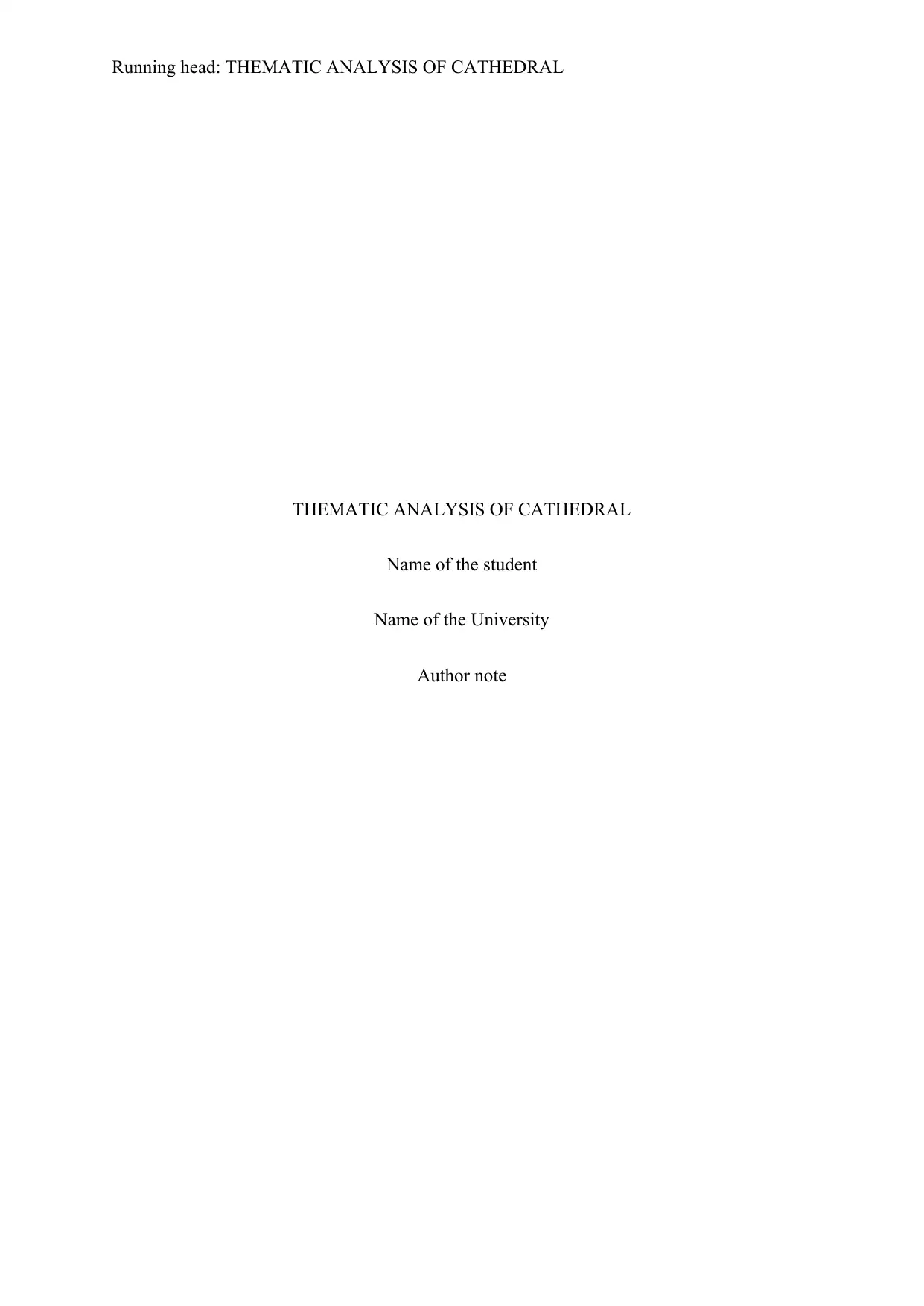
Running head: THEMATIC ANALYSIS OF CATHEDRAL
THEMATIC ANALYSIS OF CATHEDRAL
Name of the student
Name of the University
Author note
THEMATIC ANALYSIS OF CATHEDRAL
Name of the student
Name of the University
Author note
Paraphrase This Document
Need a fresh take? Get an instant paraphrase of this document with our AI Paraphraser
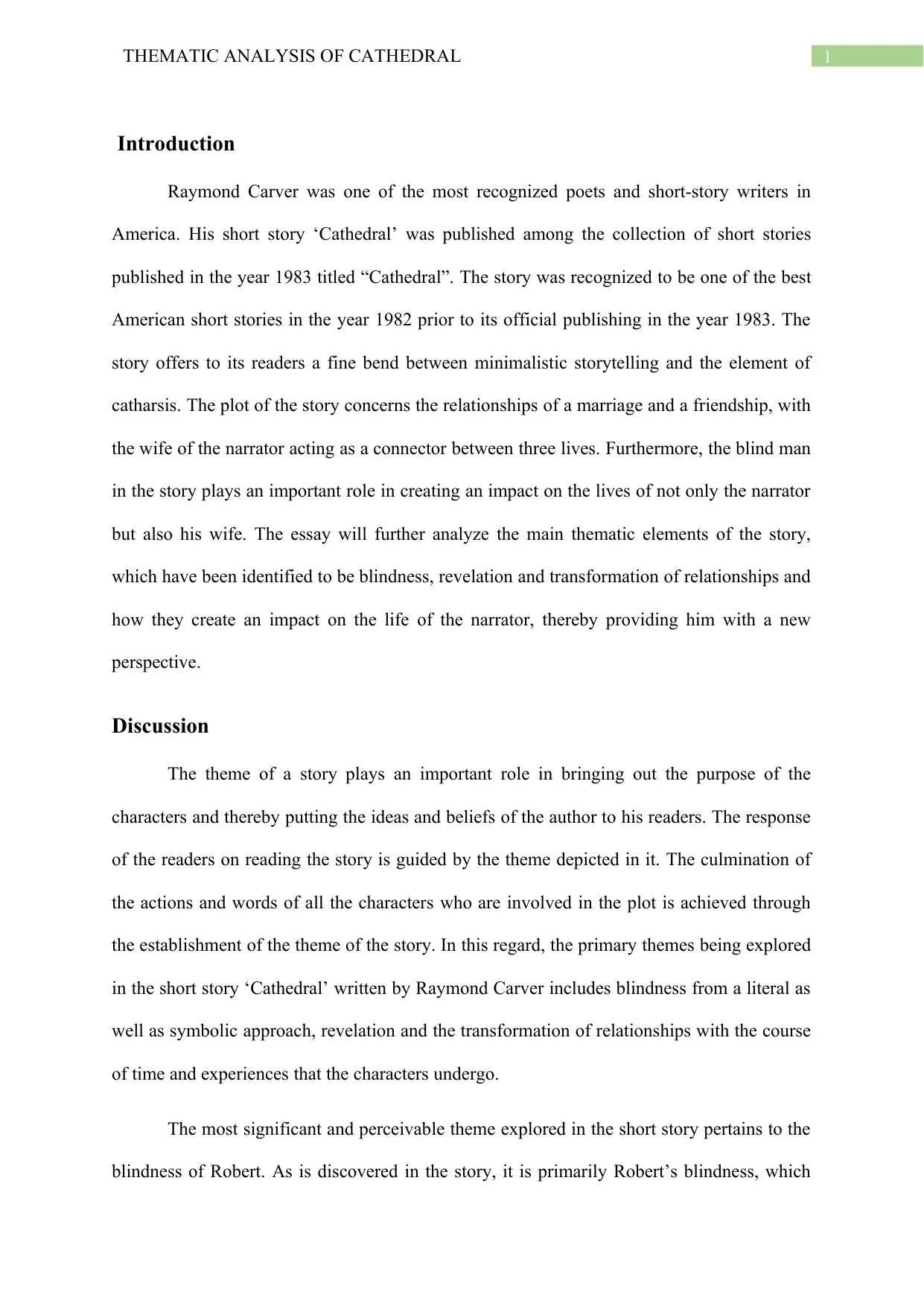
1THEMATIC ANALYSIS OF CATHEDRAL
Introduction
Raymond Carver was one of the most recognized poets and short-story writers in
America. His short story ‘Cathedral’ was published among the collection of short stories
published in the year 1983 titled “Cathedral”. The story was recognized to be one of the best
American short stories in the year 1982 prior to its official publishing in the year 1983. The
story offers to its readers a fine bend between minimalistic storytelling and the element of
catharsis. The plot of the story concerns the relationships of a marriage and a friendship, with
the wife of the narrator acting as a connector between three lives. Furthermore, the blind man
in the story plays an important role in creating an impact on the lives of not only the narrator
but also his wife. The essay will further analyze the main thematic elements of the story,
which have been identified to be blindness, revelation and transformation of relationships and
how they create an impact on the life of the narrator, thereby providing him with a new
perspective.
Discussion
The theme of a story plays an important role in bringing out the purpose of the
characters and thereby putting the ideas and beliefs of the author to his readers. The response
of the readers on reading the story is guided by the theme depicted in it. The culmination of
the actions and words of all the characters who are involved in the plot is achieved through
the establishment of the theme of the story. In this regard, the primary themes being explored
in the short story ‘Cathedral’ written by Raymond Carver includes blindness from a literal as
well as symbolic approach, revelation and the transformation of relationships with the course
of time and experiences that the characters undergo.
The most significant and perceivable theme explored in the short story pertains to the
blindness of Robert. As is discovered in the story, it is primarily Robert’s blindness, which
Introduction
Raymond Carver was one of the most recognized poets and short-story writers in
America. His short story ‘Cathedral’ was published among the collection of short stories
published in the year 1983 titled “Cathedral”. The story was recognized to be one of the best
American short stories in the year 1982 prior to its official publishing in the year 1983. The
story offers to its readers a fine bend between minimalistic storytelling and the element of
catharsis. The plot of the story concerns the relationships of a marriage and a friendship, with
the wife of the narrator acting as a connector between three lives. Furthermore, the blind man
in the story plays an important role in creating an impact on the lives of not only the narrator
but also his wife. The essay will further analyze the main thematic elements of the story,
which have been identified to be blindness, revelation and transformation of relationships and
how they create an impact on the life of the narrator, thereby providing him with a new
perspective.
Discussion
The theme of a story plays an important role in bringing out the purpose of the
characters and thereby putting the ideas and beliefs of the author to his readers. The response
of the readers on reading the story is guided by the theme depicted in it. The culmination of
the actions and words of all the characters who are involved in the plot is achieved through
the establishment of the theme of the story. In this regard, the primary themes being explored
in the short story ‘Cathedral’ written by Raymond Carver includes blindness from a literal as
well as symbolic approach, revelation and the transformation of relationships with the course
of time and experiences that the characters undergo.
The most significant and perceivable theme explored in the short story pertains to the
blindness of Robert. As is discovered in the story, it is primarily Robert’s blindness, which
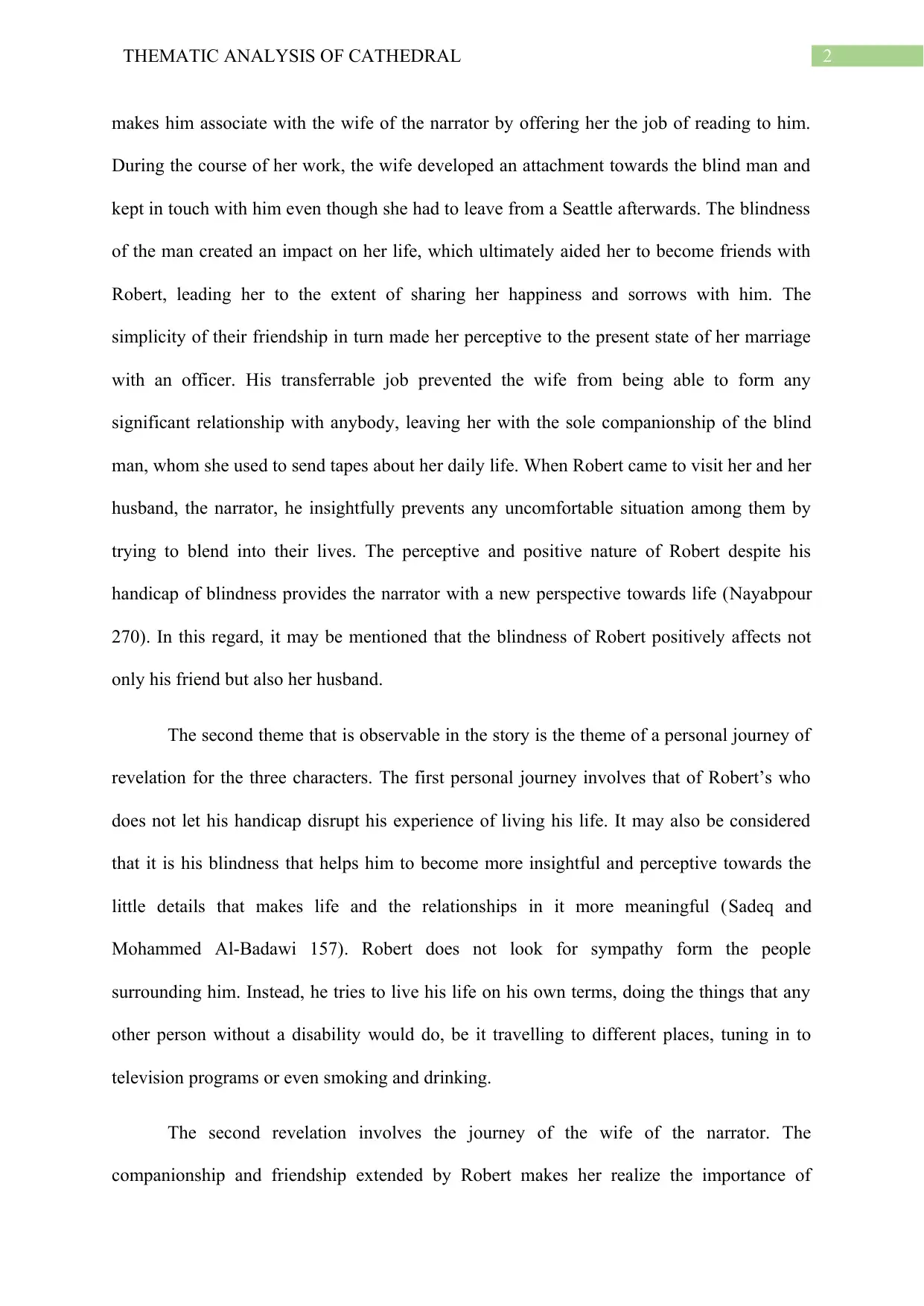
2THEMATIC ANALYSIS OF CATHEDRAL
makes him associate with the wife of the narrator by offering her the job of reading to him.
During the course of her work, the wife developed an attachment towards the blind man and
kept in touch with him even though she had to leave from a Seattle afterwards. The blindness
of the man created an impact on her life, which ultimately aided her to become friends with
Robert, leading her to the extent of sharing her happiness and sorrows with him. The
simplicity of their friendship in turn made her perceptive to the present state of her marriage
with an officer. His transferrable job prevented the wife from being able to form any
significant relationship with anybody, leaving her with the sole companionship of the blind
man, whom she used to send tapes about her daily life. When Robert came to visit her and her
husband, the narrator, he insightfully prevents any uncomfortable situation among them by
trying to blend into their lives. The perceptive and positive nature of Robert despite his
handicap of blindness provides the narrator with a new perspective towards life (Nayabpour
270). In this regard, it may be mentioned that the blindness of Robert positively affects not
only his friend but also her husband.
The second theme that is observable in the story is the theme of a personal journey of
revelation for the three characters. The first personal journey involves that of Robert’s who
does not let his handicap disrupt his experience of living his life. It may also be considered
that it is his blindness that helps him to become more insightful and perceptive towards the
little details that makes life and the relationships in it more meaningful (Sadeq and
Mohammed Al-Badawi 157). Robert does not look for sympathy form the people
surrounding him. Instead, he tries to live his life on his own terms, doing the things that any
other person without a disability would do, be it travelling to different places, tuning in to
television programs or even smoking and drinking.
The second revelation involves the journey of the wife of the narrator. The
companionship and friendship extended by Robert makes her realize the importance of
makes him associate with the wife of the narrator by offering her the job of reading to him.
During the course of her work, the wife developed an attachment towards the blind man and
kept in touch with him even though she had to leave from a Seattle afterwards. The blindness
of the man created an impact on her life, which ultimately aided her to become friends with
Robert, leading her to the extent of sharing her happiness and sorrows with him. The
simplicity of their friendship in turn made her perceptive to the present state of her marriage
with an officer. His transferrable job prevented the wife from being able to form any
significant relationship with anybody, leaving her with the sole companionship of the blind
man, whom she used to send tapes about her daily life. When Robert came to visit her and her
husband, the narrator, he insightfully prevents any uncomfortable situation among them by
trying to blend into their lives. The perceptive and positive nature of Robert despite his
handicap of blindness provides the narrator with a new perspective towards life (Nayabpour
270). In this regard, it may be mentioned that the blindness of Robert positively affects not
only his friend but also her husband.
The second theme that is observable in the story is the theme of a personal journey of
revelation for the three characters. The first personal journey involves that of Robert’s who
does not let his handicap disrupt his experience of living his life. It may also be considered
that it is his blindness that helps him to become more insightful and perceptive towards the
little details that makes life and the relationships in it more meaningful (Sadeq and
Mohammed Al-Badawi 157). Robert does not look for sympathy form the people
surrounding him. Instead, he tries to live his life on his own terms, doing the things that any
other person without a disability would do, be it travelling to different places, tuning in to
television programs or even smoking and drinking.
The second revelation involves the journey of the wife of the narrator. The
companionship and friendship extended by Robert makes her realize the importance of
⊘ This is a preview!⊘
Do you want full access?
Subscribe today to unlock all pages.

Trusted by 1+ million students worldwide
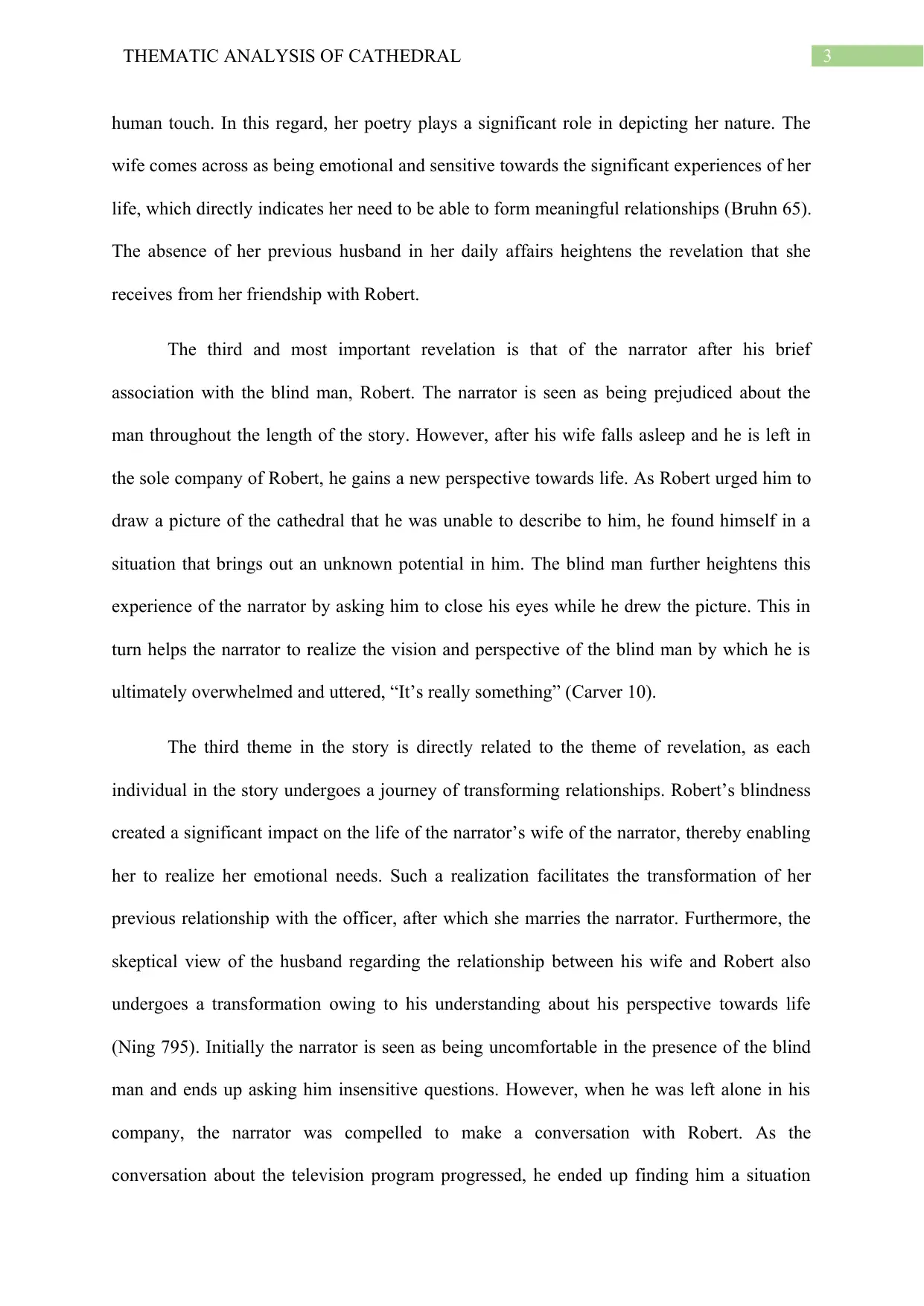
3THEMATIC ANALYSIS OF CATHEDRAL
human touch. In this regard, her poetry plays a significant role in depicting her nature. The
wife comes across as being emotional and sensitive towards the significant experiences of her
life, which directly indicates her need to be able to form meaningful relationships (Bruhn 65).
The absence of her previous husband in her daily affairs heightens the revelation that she
receives from her friendship with Robert.
The third and most important revelation is that of the narrator after his brief
association with the blind man, Robert. The narrator is seen as being prejudiced about the
man throughout the length of the story. However, after his wife falls asleep and he is left in
the sole company of Robert, he gains a new perspective towards life. As Robert urged him to
draw a picture of the cathedral that he was unable to describe to him, he found himself in a
situation that brings out an unknown potential in him. The blind man further heightens this
experience of the narrator by asking him to close his eyes while he drew the picture. This in
turn helps the narrator to realize the vision and perspective of the blind man by which he is
ultimately overwhelmed and uttered, “It’s really something” (Carver 10).
The third theme in the story is directly related to the theme of revelation, as each
individual in the story undergoes a journey of transforming relationships. Robert’s blindness
created a significant impact on the life of the narrator’s wife of the narrator, thereby enabling
her to realize her emotional needs. Such a realization facilitates the transformation of her
previous relationship with the officer, after which she marries the narrator. Furthermore, the
skeptical view of the husband regarding the relationship between his wife and Robert also
undergoes a transformation owing to his understanding about his perspective towards life
(Ning 795). Initially the narrator is seen as being uncomfortable in the presence of the blind
man and ends up asking him insensitive questions. However, when he was left alone in his
company, the narrator was compelled to make a conversation with Robert. As the
conversation about the television program progressed, he ended up finding him a situation
human touch. In this regard, her poetry plays a significant role in depicting her nature. The
wife comes across as being emotional and sensitive towards the significant experiences of her
life, which directly indicates her need to be able to form meaningful relationships (Bruhn 65).
The absence of her previous husband in her daily affairs heightens the revelation that she
receives from her friendship with Robert.
The third and most important revelation is that of the narrator after his brief
association with the blind man, Robert. The narrator is seen as being prejudiced about the
man throughout the length of the story. However, after his wife falls asleep and he is left in
the sole company of Robert, he gains a new perspective towards life. As Robert urged him to
draw a picture of the cathedral that he was unable to describe to him, he found himself in a
situation that brings out an unknown potential in him. The blind man further heightens this
experience of the narrator by asking him to close his eyes while he drew the picture. This in
turn helps the narrator to realize the vision and perspective of the blind man by which he is
ultimately overwhelmed and uttered, “It’s really something” (Carver 10).
The third theme in the story is directly related to the theme of revelation, as each
individual in the story undergoes a journey of transforming relationships. Robert’s blindness
created a significant impact on the life of the narrator’s wife of the narrator, thereby enabling
her to realize her emotional needs. Such a realization facilitates the transformation of her
previous relationship with the officer, after which she marries the narrator. Furthermore, the
skeptical view of the husband regarding the relationship between his wife and Robert also
undergoes a transformation owing to his understanding about his perspective towards life
(Ning 795). Initially the narrator is seen as being uncomfortable in the presence of the blind
man and ends up asking him insensitive questions. However, when he was left alone in his
company, the narrator was compelled to make a conversation with Robert. As the
conversation about the television program progressed, he ended up finding him a situation
Paraphrase This Document
Need a fresh take? Get an instant paraphrase of this document with our AI Paraphraser
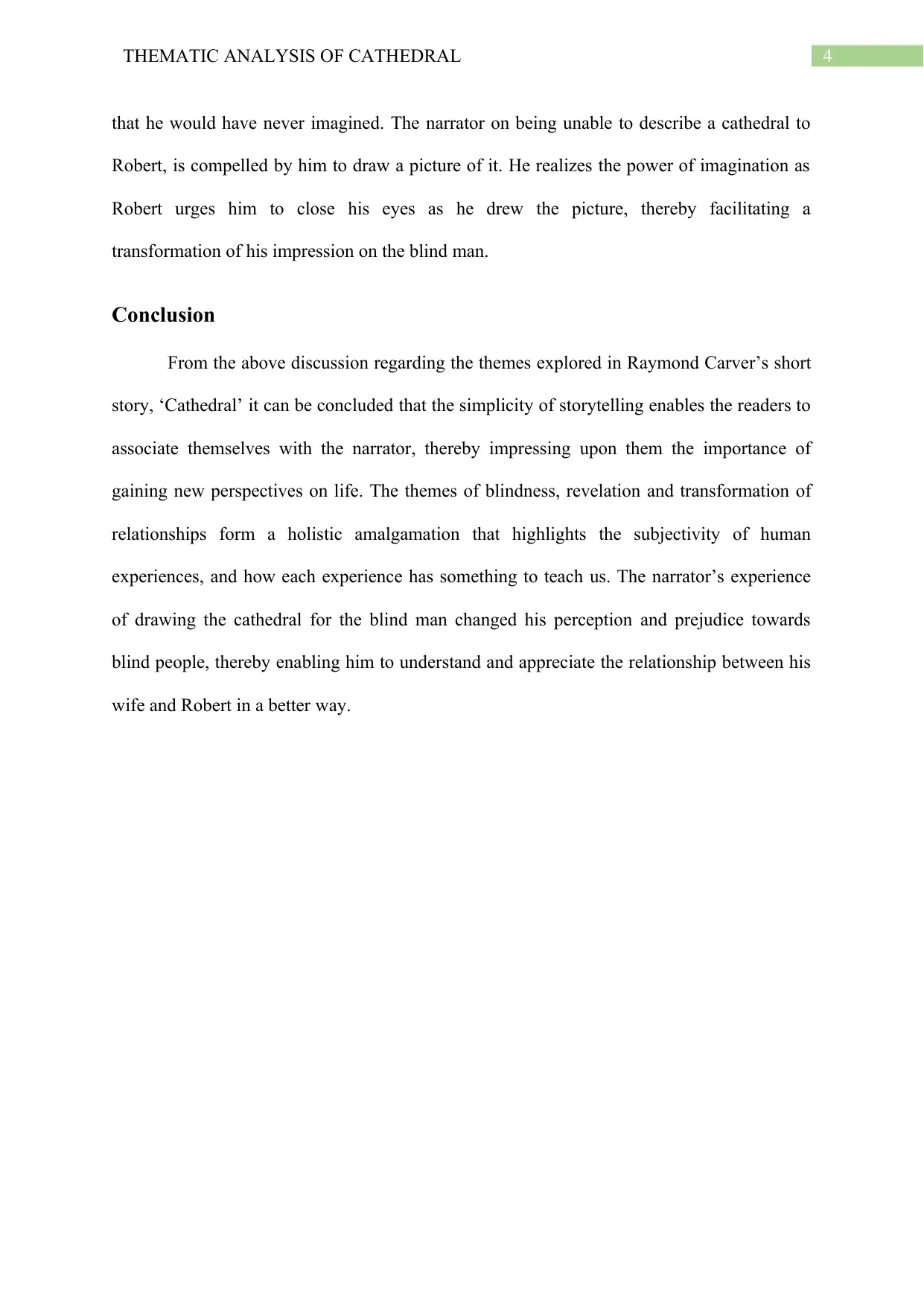
4THEMATIC ANALYSIS OF CATHEDRAL
that he would have never imagined. The narrator on being unable to describe a cathedral to
Robert, is compelled by him to draw a picture of it. He realizes the power of imagination as
Robert urges him to close his eyes as he drew the picture, thereby facilitating a
transformation of his impression on the blind man.
Conclusion
From the above discussion regarding the themes explored in Raymond Carver’s short
story, ‘Cathedral’ it can be concluded that the simplicity of storytelling enables the readers to
associate themselves with the narrator, thereby impressing upon them the importance of
gaining new perspectives on life. The themes of blindness, revelation and transformation of
relationships form a holistic amalgamation that highlights the subjectivity of human
experiences, and how each experience has something to teach us. The narrator’s experience
of drawing the cathedral for the blind man changed his perception and prejudice towards
blind people, thereby enabling him to understand and appreciate the relationship between his
wife and Robert in a better way.
that he would have never imagined. The narrator on being unable to describe a cathedral to
Robert, is compelled by him to draw a picture of it. He realizes the power of imagination as
Robert urges him to close his eyes as he drew the picture, thereby facilitating a
transformation of his impression on the blind man.
Conclusion
From the above discussion regarding the themes explored in Raymond Carver’s short
story, ‘Cathedral’ it can be concluded that the simplicity of storytelling enables the readers to
associate themselves with the narrator, thereby impressing upon them the importance of
gaining new perspectives on life. The themes of blindness, revelation and transformation of
relationships form a holistic amalgamation that highlights the subjectivity of human
experiences, and how each experience has something to teach us. The narrator’s experience
of drawing the cathedral for the blind man changed his perception and prejudice towards
blind people, thereby enabling him to understand and appreciate the relationship between his
wife and Robert in a better way.
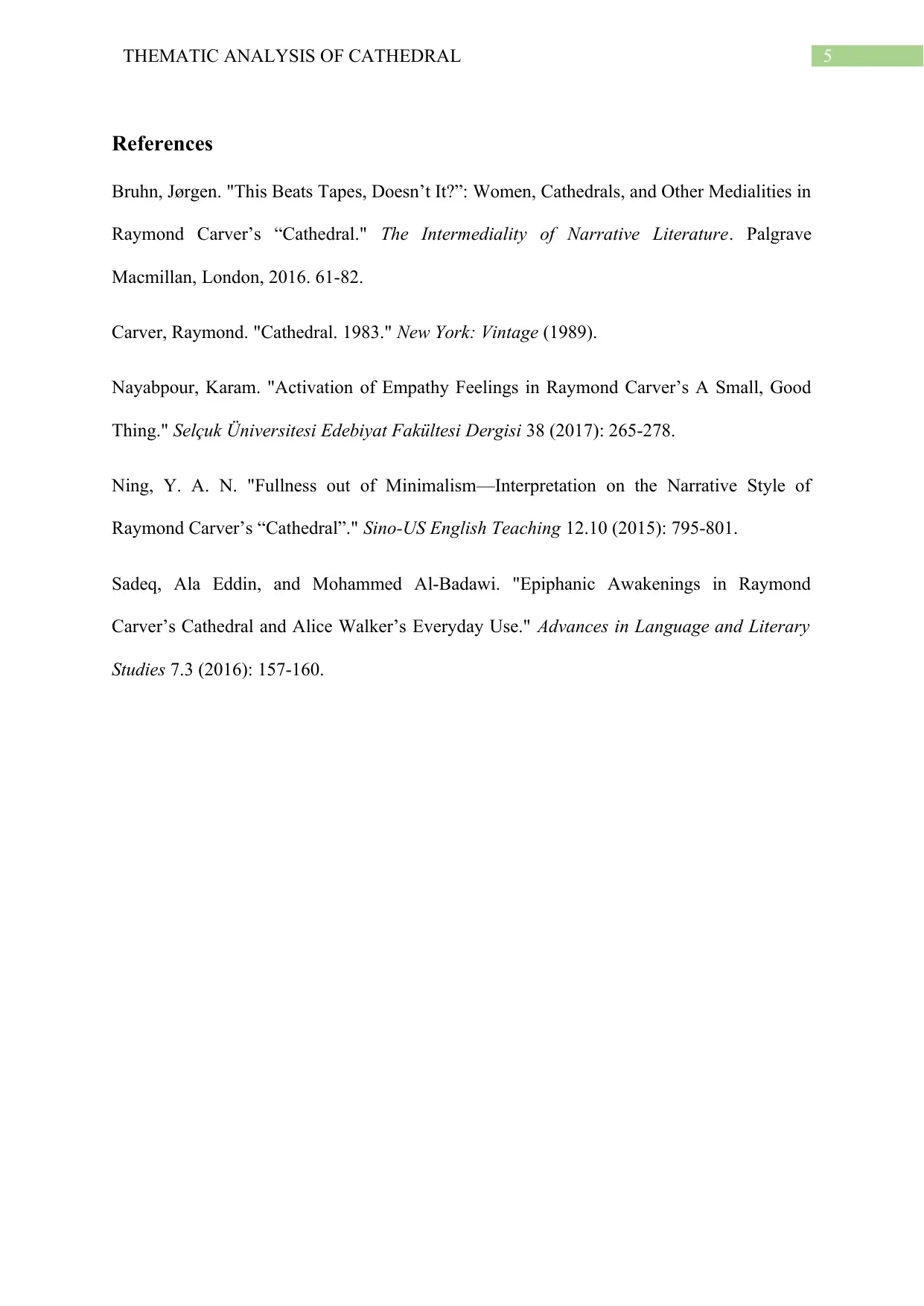
5THEMATIC ANALYSIS OF CATHEDRAL
References
Bruhn, Jørgen. "This Beats Tapes, Doesn’t It?”: Women, Cathedrals, and Other Medialities in
Raymond Carver’s “Cathedral." The Intermediality of Narrative Literature. Palgrave
Macmillan, London, 2016. 61-82.
Carver, Raymond. "Cathedral. 1983." New York: Vintage (1989).
Nayabpour, Karam. "Activation of Empathy Feelings in Raymond Carver’s A Small, Good
Thing." Selçuk Üniversitesi Edebiyat Fakültesi Dergisi 38 (2017): 265-278.
Ning, Y. A. N. "Fullness out of Minimalism—Interpretation on the Narrative Style of
Raymond Carver’s “Cathedral”." Sino-US English Teaching 12.10 (2015): 795-801.
Sadeq, Ala Eddin, and Mohammed Al-Badawi. "Epiphanic Awakenings in Raymond
Carver’s Cathedral and Alice Walker’s Everyday Use." Advances in Language and Literary
Studies 7.3 (2016): 157-160.
References
Bruhn, Jørgen. "This Beats Tapes, Doesn’t It?”: Women, Cathedrals, and Other Medialities in
Raymond Carver’s “Cathedral." The Intermediality of Narrative Literature. Palgrave
Macmillan, London, 2016. 61-82.
Carver, Raymond. "Cathedral. 1983." New York: Vintage (1989).
Nayabpour, Karam. "Activation of Empathy Feelings in Raymond Carver’s A Small, Good
Thing." Selçuk Üniversitesi Edebiyat Fakültesi Dergisi 38 (2017): 265-278.
Ning, Y. A. N. "Fullness out of Minimalism—Interpretation on the Narrative Style of
Raymond Carver’s “Cathedral”." Sino-US English Teaching 12.10 (2015): 795-801.
Sadeq, Ala Eddin, and Mohammed Al-Badawi. "Epiphanic Awakenings in Raymond
Carver’s Cathedral and Alice Walker’s Everyday Use." Advances in Language and Literary
Studies 7.3 (2016): 157-160.
⊘ This is a preview!⊘
Do you want full access?
Subscribe today to unlock all pages.

Trusted by 1+ million students worldwide
1 out of 6
Related Documents
Your All-in-One AI-Powered Toolkit for Academic Success.
+13062052269
info@desklib.com
Available 24*7 on WhatsApp / Email
![[object Object]](/_next/static/media/star-bottom.7253800d.svg)
Unlock your academic potential
Copyright © 2020–2026 A2Z Services. All Rights Reserved. Developed and managed by ZUCOL.





